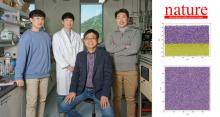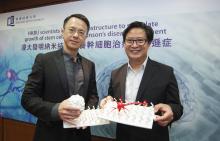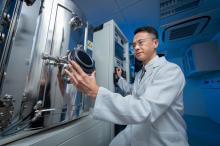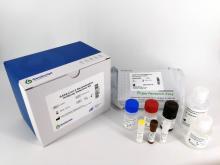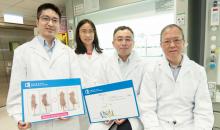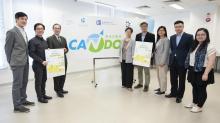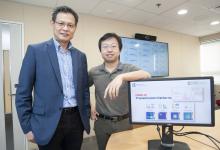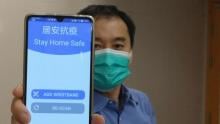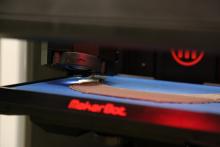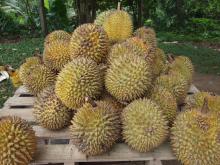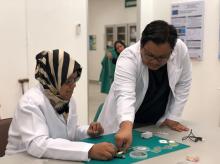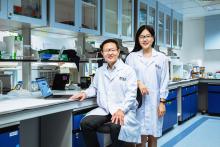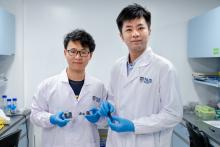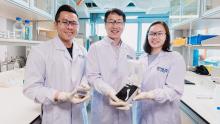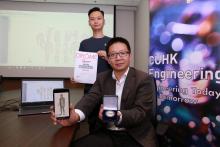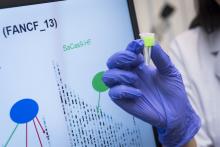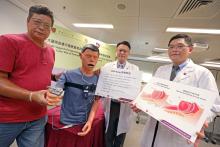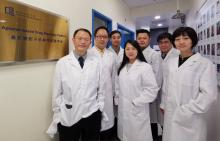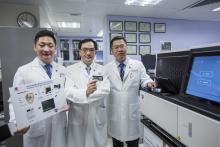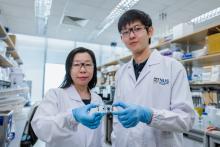Invention
News
03 Jun 2020
Researchers from Hong Kong Baptist University (HKBU) have invented a nanostructure that can stimulate neural stem cells to differentiate into nerve cells. They found that the transplantation of these nerve cells into rats with Parkinson's disease progressively improved their symptoms, with the new cells replacing damaged nerve cells around the transplantation site. This novel invention provides promising insights into stem cell therapies and offers hope of a new treatment for Parkinson's disease.

02 Jun 2020
Considering hydrogen as a clean energy for future, scientists have been striving to develop novel processes to produce hydrogen efficiently and cost-effectively. A team comprised of scientists who specialized in structure materials at City University of Hong Kong (CityU) has developed a high-performance electrocatalyst based on an innovative concept originally for developing alloys. The new electrocatalyst can be produced at large scale and low cost, providing a new paradigm in a wide application of hydrogen production by electrochemical reaction in future.
19 May 2020
Scientists from Hong Kong Baptist University (HKBU) have developed a novel technique that can produce pure therapeutic drugs without the associated side effects.
15 May 2020
As a first-in-the-world "rapid smart test kit", the cPass™ which can measure neutralising antibodies in an hour will be a huge boost to current COVID-19 investigations, from contact tracing, sero-prevalence survey, and assessment of herd immunity, longevity of protective immunity and efficacy of different vaccine candidates.
11 May 2020
A research team led by Hong Kong Baptist University (HKBU) has developed a novel anti-Epstein-Barr virus (EBV) drug that can selectively disrupt a viral protein produced by EBV, leading to the shrinkage of tumours caused by the virus. It is the first known agent to successfully target the virus and disturb its latency in tumour cells in this way.
06 May 2020
A search engine retrieves authenticated Islamic content from the Internet.
28 Apr 2020
A research team led by Hong Kong Baptist University (HKBU) has launched an online cognitive behavioural therapy (CBT) programme. Introduced in April 2020 for Hong Kong people with mild to moderate depressive symptoms, the programme provides them with easy access to counselling services and reduces the stigma associated with depression.
The team will recruit 400 participants aged between 18 and 70 with depressive symptoms and provide training next year to around 200 local mental health professionals on how to operate this online CBT programme, with the aim of serving more people in the long run.
28 Apr 2020
With the COVID-19 pandemic resulting in lockdowns in different parts of the world, from the US to many European nations, there have been intense debates on when and how we can safely reopen the economy.
New research led by Hong Kong Baptist University (HKBU) computer scientists has used a data-driven modelling approach to answer the time-critical question of when the stringent social distancing and quarantine measures against COVID-19 can be loosened so that normal life and economic activities can be restored in a safe manner.
19 Mar 2020
Researchers of the Hong Kong University of Science and Technology (HKUST) have developed a novel geo-fencing technology, offering a smart core solution that helps save the government’s manpower in monitoring those under compulsory home quarantine amid the novel pneumonia (COVID-19) outbreak.
26 Feb 2020
The Hong Kong Polytechnic University (PolyU) has been collaborating with Queen Elizabeth Hospital (QE) and the Hospital Authority (HA) respectively to design and produce 3D-printed eye shields and face shields.
20 Feb 2020
A faculty startup, based at South Korea's Ulsan National Institute of Science and Technology (UNIST) has attracted 7 Billion KRW investment.

05 Feb 2020
Generating electricity from raindrops efficiently has gone one step further. A research team led by scientists from the City University of Hong Kong (CityU) has recently developed a droplet-based electricity generator (DEG), featured with a field-effect transistor (FET)-like structure that allows for high energy-conversion efficiency and instantaneous power density increased by thousands times compared to its counterparts without FET-like structure. This would help to advance scientific research of water energy generation and tackle the energy crisis.
27 Jan 2020
Researchers at the International Islamic University Malaysia have developed biodegradable food packaging container featuring the skin of the durian fruit that can also be used as 3D printing filament.
24 Jan 2020
Researchers from the International Islamic University Malaysia (IIUM) have developed a tumor biosensing chip that can help determine the optimum dosage of chemotherapy required for a cancer patient.
14 Jan 2020
A team of researchers from the National University of Singapore has developed a personalised assessment tool which can detect the incidence of cancer, predict patient survivability and determine patient suitability for immunotherapy cancer treatment.
13 Jan 2020
A team of NUS researchers have come up with the pH Watch, an ‘add-on’ to a wearable health monitoring gadget that can tell users about the condition of their health from their sweat pH.

17 Dec 2019
A recent research led by City University of Hong Kong (CityU) has discovered that the ultrathin gold nanoribbons with unique hexagonal (4H type) crystal phase shows “liquid-like” behaviour under heating, but its hexagonal crystalline structure remains stable. This provides insight into the thermal stability of this new type of metallic nanomaterials and facilitates the development of practical applications in the future.
25 Nov 2019
A team from the National University of Singapore has created a material that is half as light as paper and highly flexible but also shows enhanced characteristics for electrical conductivity, heat generation, fire-resistance, strain-sensing and is inherently capable of wireless communications.

22 Nov 2019
Sensing a hug from your friend through a video call with him/her may become a reality soon. A joint-research team consisted of scientists and engineers from City University of Hong Kong (CityU) and Northwestern University in the United States has developed a skin-integrated virtual reality (VR) system, which can be controlled and powered wirelessly. The innovation has great application potential in communications, prosthetic control and rehabilitation, as well as gaming and entertainment.
06 Nov 2019
A team of engineers from the National University of Singapore has developed a highly sensitive system that uses a smartphone to rapidly detect the presence of toxin-producing algae in water within 15 minutes. This technological breakthrough could play a big role in preventing the spread of harmful microorganisms in aquatic environments, which could threaten global public health and cause environmental problems.
01 Nov 2019
The pursuit of an improved quality of life by people with increasing requirements means that conventional technology with single and standardised measurements no longer meets consumer demand. The fabrication of personalised clothes and footwear is one of the important factors that has led to the development in smart living. Prof. Charlie C.L. Wang from the Department of Mechanical and Automation Engineering of The Chinese University of Hong Kong (CUHK) and his team have pioneered Shape Driven Technology. After further improvement and development, it is now equipped with the mature fast scanning, the big-data driven artificial intelligence and the digital knitting technology to achieve its mission of automatically fabricating personalised clothes and footwear according to individual forms. In the future, consumers will be able to place orders directly with manufacturers to fabricate customised wearable products in all kinds of styles, quickly and easily. It will take the operation mode of the manufacturing industry into a great leap towards realising the upgrade to Industry 4.0 (I4.0) / smart manufacturing. This project recently won the Silver Award in the 47th Geneva International Invention Exhibition.
01 Nov 2019
A research team led by Professor Wei-Hsin Liao from the Department of Mechanical and Automation Engineering, The Chinese University of Hong Kong (CUHK) has developed a lightweight smart materials-based energy harvester for scavenging energy from human motion, generating inexhaustible and sustainable power supply just from walking. Specifically, the device can capture biomechanical energy from the motion of the human knee and then convert it to electricity which can be used to power wearable electronics such as pedometers, health monitors, and GPS. This work has been published in Applied Physics Letters and recommended as a featured article by editors.
01 Nov 2019
A team of researchers from City University of Hong Kong (CityU) and Karolinska Institutet has recently developed a new protein which can help increase the targeting accuracy in the genome editing process. It is believed that it would be useful for future gene therapies in human which require high precision.
31 Oct 2019
The Faculty of Medicine of The Chinese University of Hong Kong (CUHK) conducted the world’s first study to investigate the association between unrecognised obstructive sleep apnoea (OSA) and postoperative cardiovascular complications. Results showed that patients with unrecognised severe OSA have a two-fold increased risk of postoperative cardiovascular complications compared to those without the disorder. The study has recently been published in the Journal of the American Medical Association (JAMA), suggesting that preoperative OSA screening should be considered in clinical practice to lower the risk of postoperative cardiovascular events.

24 Oct 2019
A recent research led by a scientist at City University of Hong Kong (CityU) has discovered an easily transmitted DNA piece that can make a new type of hyper-resistant and deadly superbug become hyper-virulent quickly, posing an unprecedented threat to human health.
23 Oct 2019
A research team from the School of Chinese Medicine at Hong Kong Baptist University (HKBU) has successfully developed a novel aptamer, i.e. a single-stranded piece of DNA, for the treatment of osteogenesis imperfecta (OI) with the aid of artificial intelligence (AI) technology. It is the first time a drug in Hong Kong has been granted orphan drug designation by the US Food and Drug Administration (FDA).
18 Oct 2019
Bamboo, lime and mud are traditional materials being used innovatively in southern India to rebuild homes that can withstand the impact of recurring floods.
18 Sep 2019
The Department of Obstetrics and Gynaecology of the Faculty of Medicine at The Chinese University of Hong Kong (CUHK) has successfully introduced a new genome sequencing technique for prenatal invasive genetic diagnosis. It offers enhanced sensitivity and accuracy of diagnosing lethal and severe congenital disorders through precise detection of pathogenic microdeletion or microduplication in the fetus, compared with the current practice karyotyping analysis and chromosomal microarray analysis (as known as fetal DNA chip testing). The team conducted a study on the innovation and the findings were recently published on the international journal Genetics in Medicine.
10 Sep 2019
STAMP technology is a million times more sensitive and comprehensive to accurately detect and classify tumours from a small clinical sample
Events
Sorry, no events coming up for this topic.
Researchers
Sorry, no researchers coming up for this topic.
Giants in history
Sorry, no researchers coming up for this topic.


